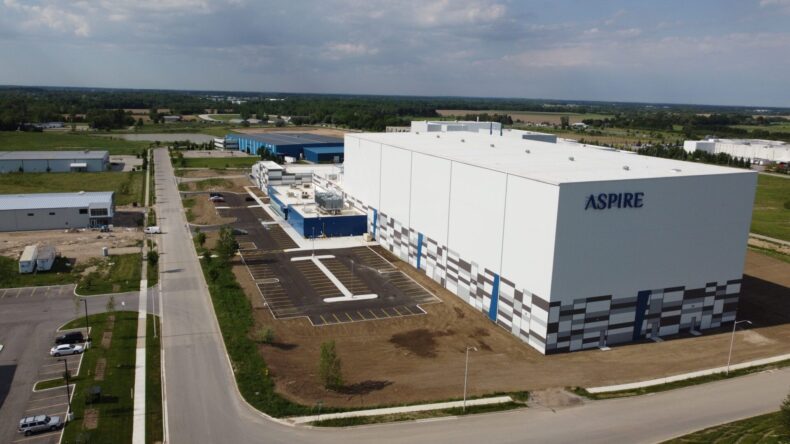Canadian insect ag pioneer Aspire Food Group has laid off more staff amid ongoing uncertainty over tariffs and trade, but says it is actively pursuing a deal through a court-supervised process that could enable it to preserve operations.
Speaking to AgFunderNews as FTI Consulting Canada Inc was appointed receiver to Aspire following an application from creditor Farm Credit Canada, CEO David Rosenberg explained: “While we’ve increased our yields [of cricket protein] very significantly, we need more capital to make the changes we need to make, and it’s very hard to raise capital with a lot of debt. So we needed to negotiate a solution with debt holders, some secured, some unsecured. And it was best to do that via a court-supervised process.
“We’re working closely with the bank, which wants to see us succeed, so we’re trying to put financing together. We still have about 16 people on the team.”
The firm—which laid off two-thirds of its 150 employees and scaled back production at its cricket farming facility in London, Ontario in November—“made the difficult decision to [further] reduce its workforce,” according to a LinkedIn post penned on Tuesday.
The move follows recent grim news from European insect ag firms Enorm Biofactory, Ÿnsect, and Agronutris, which have all been forced to reassess their business models as investor sentiment has soured on the sector.
According to Aspire, its situation materially worsened early this year when the Trump administration announced tariffs on goods coming into the US from Canada, which were subsequently scaled back, but created significant uncertainty.
“With nearly all of Aspire’s product sales destined for US pet food manufacturers, these tariffs introduced a sudden and severe disruption to its commercial model, compounding the pressure on the business during an already complex restructuring effort,” said Rosenberg, who cofounded vertical farming startup AeroFarms and took on the CEO role at Aspire in late 2023.
“Like many Canadian exporters, we’ve had to absorb shocks that were entirely outside our control. The tariffs fundamentally disrupted our primary market and introduced volatility that made it extremely difficult to execute on long-term plans. We’ve fought hard to navigate these headwinds—and are still doing everything we can to secure a solution that reflects the value we’ve built.”
Aspire has “signed two term sheets with prospective partners and is in active discussions with stakeholders to pursue a transaction that could preserve operations, allow it to scale and renew long-term value,” he added.
Court-supervised process
While Aspire has made significant progress in automating its operations and improving production efficiency, it has nevertheless “reached a point where deeper structural change is required to sustain operations,” explained the firm.
“The court-supervised process is providing a structured framework to pursue that change. A negotiated settlement agreement with the court-appointed receiver outlines a potential path toward a successful transaction.”
“We are incredibly proud of what this team has built,” said Rosenberg. “Aspire remains focused on concluding a successful transaction and continues to engage closely with all key stakeholders.”
In court documents filed on May 1 at the Superior Court of Justice in Ontario, lawyers for Farm Credit Canada (FCC) wrote: “FCC has provided the Aspire borrowers with opportunities to secure emergency liquidity to meet pressing obligations such as payroll, and entered into the adjournment letter in order to provide the Aspire Group with additional time to finalize a repayment transaction…
“At this juncture, it has become clear to FCC that the possibility of the Aspire Borrowers finalizing a Repayment Transaction in the near term and on terms satisfactory to FCC is negligible… It is time for a FTI, an independent and expert third party, to take control of the business.”
According to the documents, As of January 17, 2025, Farm Credit Canada is owed about CAD$41.5 million.
The world’s largest cricket processing facility
Billed by Aspire as the world’s largest cricket processing facility, Aspire’s 150,000 sq ft facility in London, Ontario, supplies frozen whole crickets that customers can further process.
About 25% of the funding for the plant came from government grants, 30% came from a loan, and the balance from equity, said Ashour in an interview with AgFunderNews in March 2023 in which he claimed to have “significant contractual commitments for the majority of our production.”
He added: “Substantially all of our production is going into petfood in North America but we’re also having exciting discussions with companies outside of North America in human food and petfood.”
Founded in 2012 by five MBA students from McGill University, Aspire acquired the EXO cricket bar brand in 2018 before selling it to Hoppy Planet Foods in 2021 in order to focus exclusively on cricket farming and production.
One insect industry source told us: “It must be hard and expensive to be alone in the cricket sector [when you have to] do everything: technology, AAFCO definition, research, market, etc. I think to be competitive with insects other than BSFL, they had to go ‘all in’ in automation, but with insects we’ve learned that it’s not an easy path.
“I think they’ve stalled in term of bioconversion rates and ramp up in the last few years, but they were making great progress. However, the financial market might not be that patient.”





